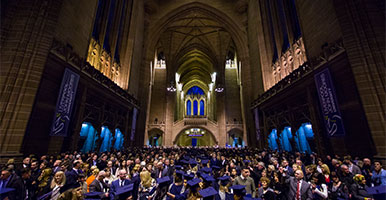Jonathan Falkingham MBE
Presented by Tom Bloxham
Honourable Pro-Chancellor, I have pleasure in presenting Jonathan Falkingham MBE for the award of an Honorary Fellowship from Liverpool John Moores University.
Although I am not an employee of LJMU, I too am also privileged to hold an Honorary Fellowship from this great University and although this is the first time I've had the privilege of delivering this Honorary Fellowship citation wearing another hat, as Chancellor of University of Manchester I've had the honour to give out hundreds of degrees over the past 5 years. However, never has it given me so much pleasure as today.
I have known Jonathan for over 25 years, we started up in business together, we have seen the ups and downs of business, seen our kids grow up, have been not only business partners but also the best of friends and we have shared many of life's highs and lows, not to mention a few drinks!
It's a great privilege to be here in this great building, in this great city and great University.
This is a truly civic university, firmly rooted in this extraordinary city, and its defining ethos comprises three deceptively simple yet very powerful words: Dream. Plan. Achieve.
Each year at Graduation, the University's highest honour – an Honorary Fellowship – is bestowed on a select band of individuals outside the University, in recognition of their outstanding achievement in a given field or profession, and who personify and inspire others to 'dream, plan, and achieve.'
'Jonathan is a rare breed – a talented and award-winning architect with a fondness for down-at-heel buildings from Britain's industrial past, coupled with the entrepreneurial spirit and daring to return this heritage to twenty first century use.
As co-founder and Creative Director and the clever one of the renowned urban regeneration company Urban Splash, he has been the creative force that has brought beautiful buildings back to life in many of our cities. Iconic buildings including; Fort Dunlop in Birmingham, Plymouth's Royal William Yard and in Liverpool; The Matchworks, Collegiate, Old Hay Market and many more buildings in Liverpool's Ropewalks area are all testimony to Jonathan's vision, who we propose today, in recognition of his services to entrepreneurship and regeneration.
Jonathan left his native Bradford to study architecture at the University of Liverpool, graduating with first class honours. The Liverpool he graduated into in 1981 was not the handsome city we see today. It had endured decades of neglect and was beset by social and economic troubles - in terms of physical infrastructure it was at its lowest ebb and unemployment was rife. Undeterred, Jonathan elected to stay and set up his own architecture practice – Design Shed – with his brother Miles.
Fast forward 26 years, and today his graduate start-up has morphed via a merger into the award-winning shedkm, which continues to be as a thriving architectural practice working in Liverpool and London. In its earliest days, Design Shed was based in the old Liverpool Palace building on the corner of Slater Street, which was my first freehold purchase in what was then a sad and rundown area. Design Shed had helped create the iconic Baa Bar there, whose design and styling helped attract the noteworthy clientele that fed its reputation.
Jonathan and I found that we shared common views around design, the power of branding and the potential for city living to revive city centres. We both thought Liverpool was an exciting city, despite its 1980s shabby image and saw its potential to be like other attractive European cities like Barcelona, Paris and Berlin, where people lived, worked and played in their beautiful historic city-centre buildings.
Jonathan and I co-founded Urban Splash in 1993, literally two men in a rather large shed defying conventional wisdom at that time by taking land and buildings widely considered to be of little value by the property world, either economically or in heritage terms, adding great design, branding and marketing and creating something new and valuable. In the beginning there was no big plan, no strategy, no idea of what we were to become, just a wholehearted belief in cities, in design, in architecture and a desire to make things better.
To make things the way we wanted them to be – different than they were before. Where property development is about fulfilling a demand, regeneration is about creating it. In the early days we worked with existing buildings that we fell in love with, buildings that had fallen apart and that we made better. Jonathan was the driving force behind our first urban project – Liverpool's Concert Square, which converted an abandoned warehouse into the north west's first loft apartments aimed at young professionals, and commercial space that is now home to a wealth of bars, galleries and creative businesses.
The first phase of the Ropewalks area, Concert Square received an RIBA Award for Architecture in 1996 and is widely acknowledged as the cornerstone of the subsequent regeneration of this area of Liverpool into the city's cultural and digital quarter. When we ran out of buildings to convert we started to make our own. We made homes, we made offices and we made special spaces in between for people to be and do things that people do – in shops, bars restaurants, parks and even hotels. In the early days we worked with existing buildings that we fell in love with, buildings that had fallen apart and that we made better.
We started in Manchester and Liverpool but soon we were being encouraged to do things in other areas: Leeds, Bradford, Plymouth, Bristol, Sheffield, Birmingham, Salford, all great cities that were thirsting for change. The company enjoyed 15 years of uninterrupted growth and accolades – to date, Urban Splash has received over 350 awards for architecture, regeneration, marketing and enterprise.
During this time, Jonathan was awarded national and Northern region Young Entrepreneur of the Year in 1999, 2005 Director of the Year by the Institute of Directors North West and several awards for the redesign and regeneration of his own home in south Liverpool, where with typical aplomb and ambition and eye for a wreck, he successfully married a Grade II listed seventeenth century building with twenty first century materials, technology and design.
However, no business can operate independently of the wider economy. When the 2008 credit crunch bit, it did so very hard and very fast. When Lehman Brothers collapsed and triggered the global banking crisis, Urban Splash had £1 billion of projects in the pipeline and £250 million of bank debt, we were spending £9 million a month on construction costs. We were not, as we initially hoped, insulated from the worst of the fall-out, even with schemes pre-sold for two years ahead. Aspirations had to be checked. Spending had to be cut. Redundancies had to be made. The business model had to be adapted.
With the benefit of hindsight, we had probably grown too fast and it was a very painful, but ultimately salutary lesson. It has taken five years to return to some semblance of financial stability during which time we have returned to our roots, with plans to revolutionise the new-build housing market and by making good design affordable.
Jonathan has faced the most testing of times, personally and professionally over the last few years but has continued to support upcoming young architects as a board member of the Liverpool Architecture and Design Advisory Panel and as a Trustee of the Royal Institute of British Architecture. He has also contributed and continues to contribute to his adopted city as a trustee of National Museums Liverpool and of the Royal Court Theatre. He is a Fellow of the Royal Society of Arts.
Most deservedly, he was awarded an MBE in the 2013 Queen's birthday honours for services to architecture and regeneration.
Thus, it is with great pleasure that I present Jonathan Falkingham, this most distinguished adopted son of our city, for admission to our highest honour, as an Honorary Fellow of Liverpool John Moores University.



